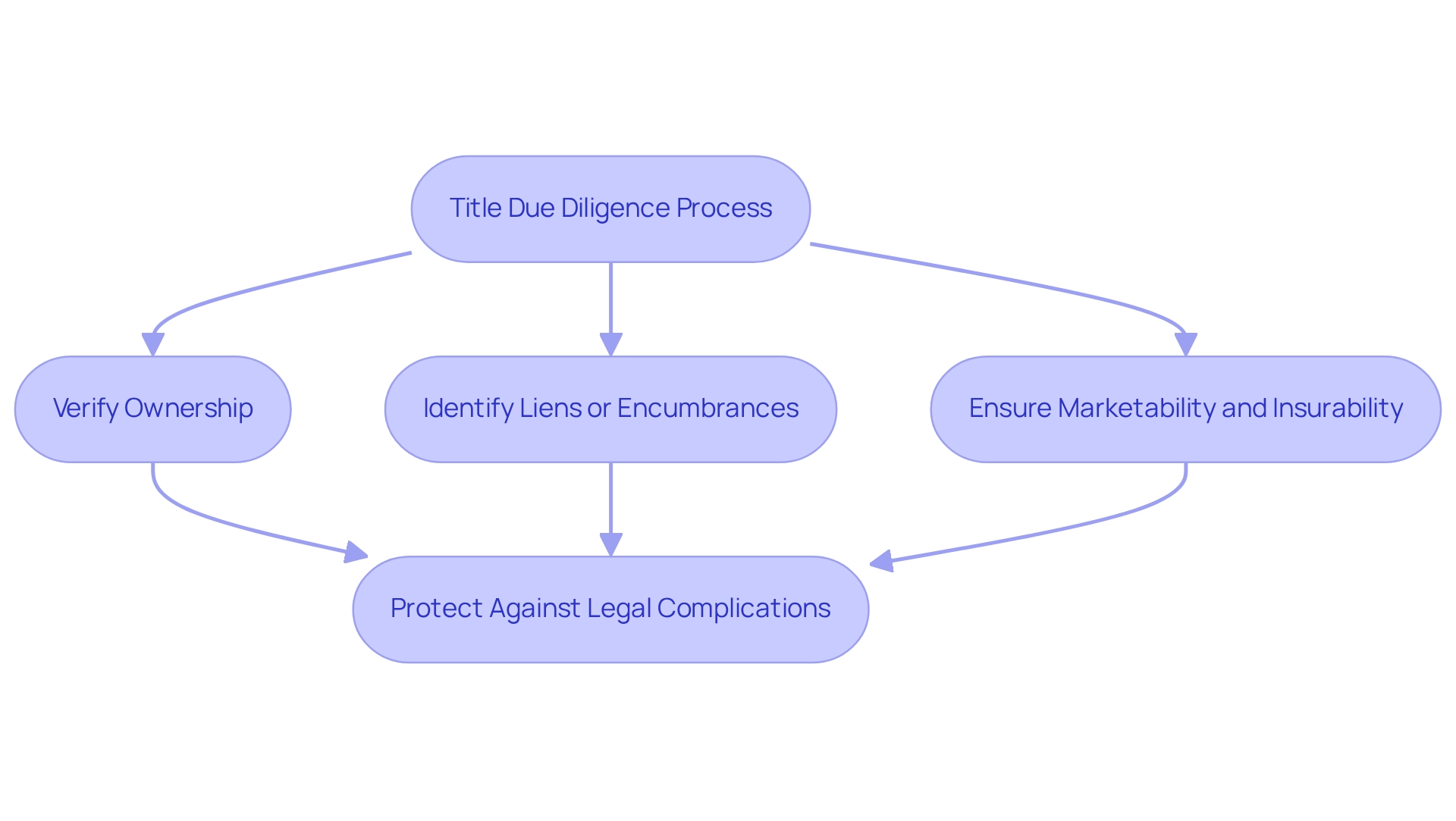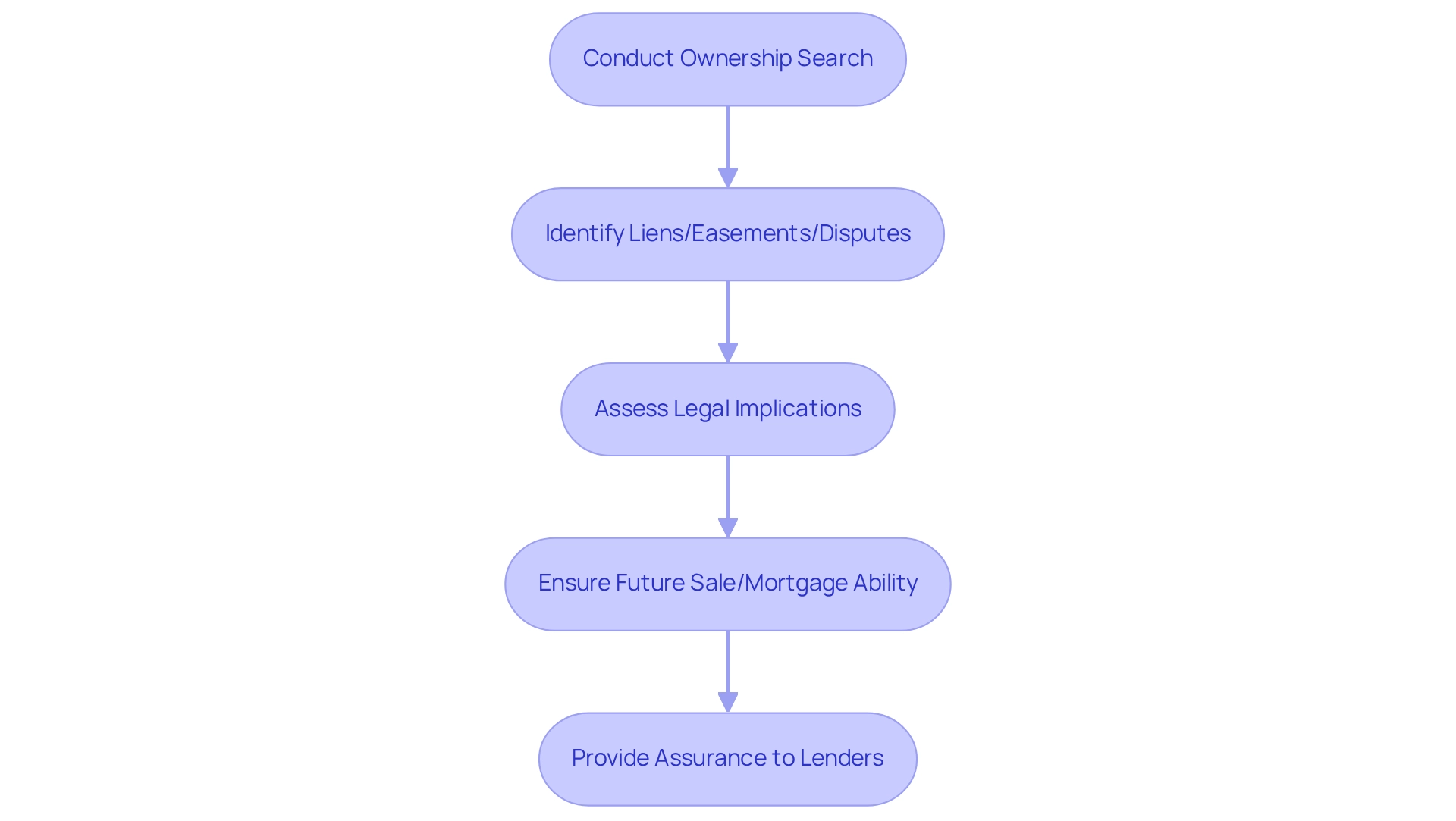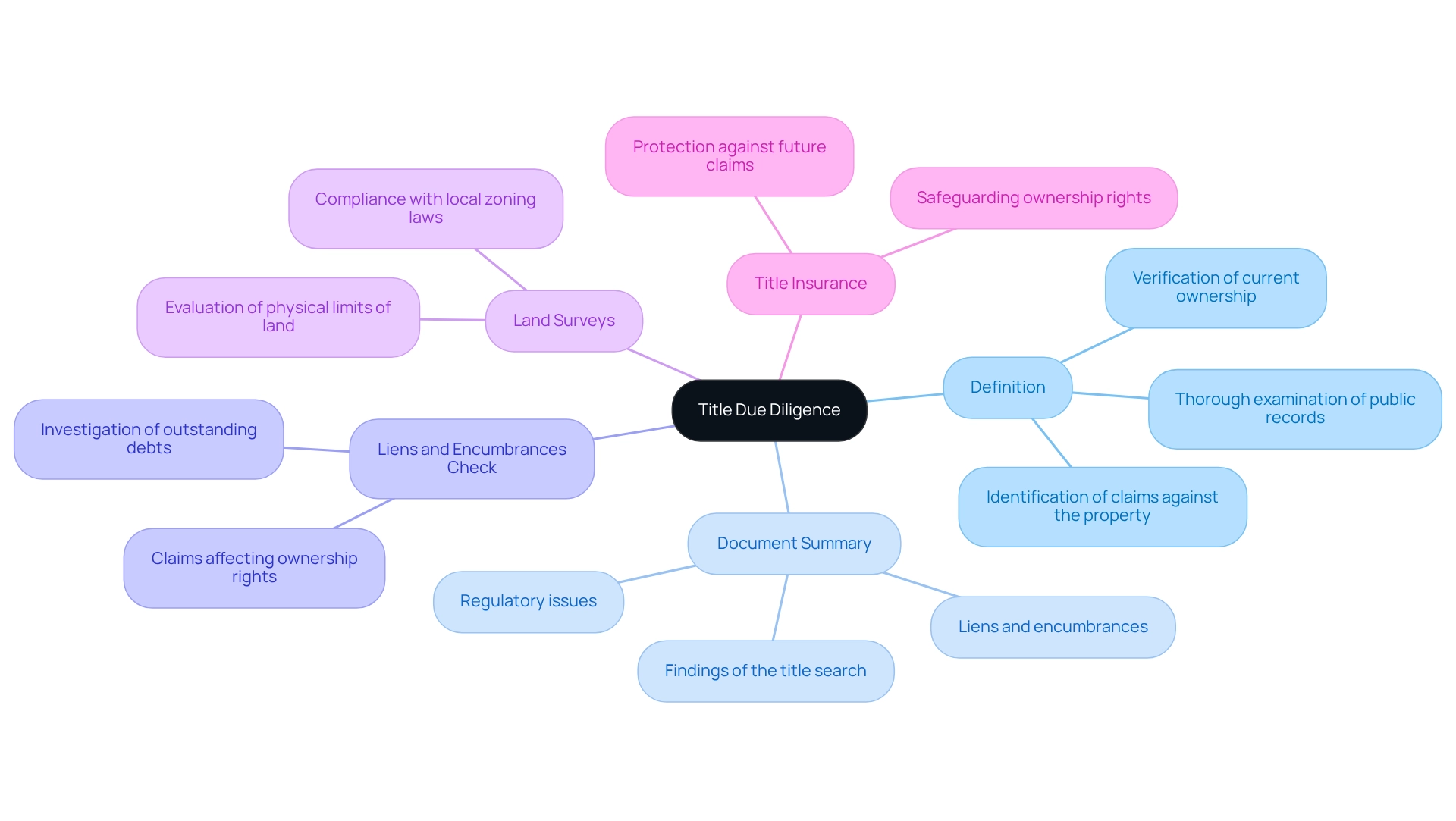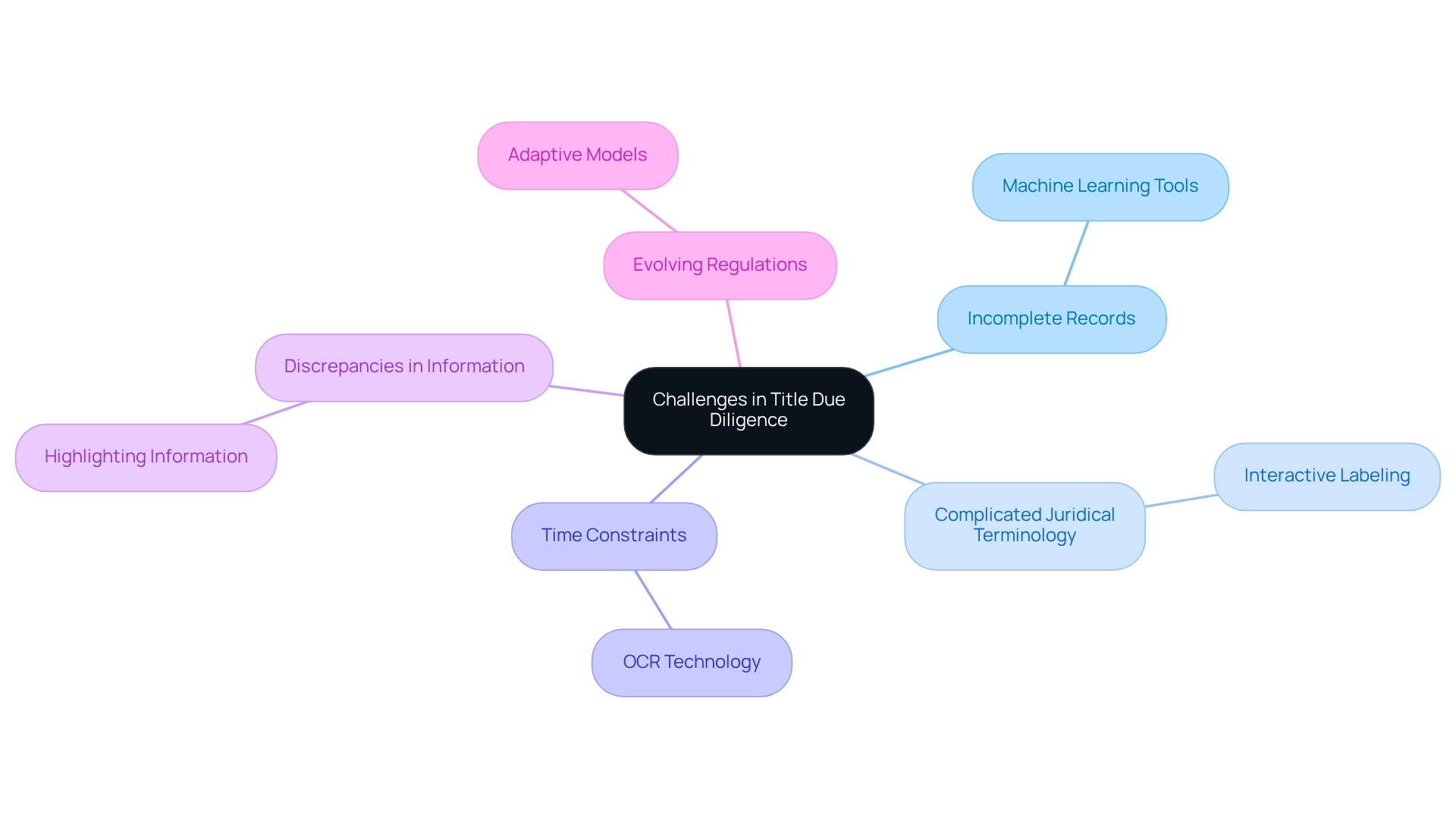Overview
Title due diligence in real estate represents a critical process that involves thoroughly examining and confirming an asset's ownership status. This includes:
- Verifying ownership
- Identifying liens or encumbrances
- Ensuring the property is both marketable and insurable
Such diligence is essential for protecting buyers from potential legal issues that may arise post-acquisition. Furthermore, it facilitates informed decision-making, ultimately ensuring a smooth transaction and safeguarding future investments.
Introduction
In the intricate world of real estate, the journey to a successful transaction hinges on a crucial step: title due diligence. This comprehensive investigation into a property's legal status serves as a safeguard for buyers, ensuring that ownership rights are clear and free from hidden complications. Furthermore, as potential legal issues can arise post-purchase, understanding the nuances of title due diligence becomes essential for both buyers and lenders alike. This article delves into the importance of this process, outlines its key components, and highlights the challenges that can arise. Consequently, it showcases innovative solutions that can streamline the due diligence journey.
Define Title Due Diligence in Real Estate
What is title due diligence in real estate? It is a crucial process that involves the meticulous examination and confirmation of an asset's ownership status prior to completing a transaction. This process entails:
- Verifying ownership
- Identifying any liens or encumbrances
- Ensuring the property is both marketable and insurable
The primary objective of ownership due diligence is to protect purchasers from potential legal complications that may arise post-acquisition, including disputes over possession or claims related to the asset.
What is title due diligence, and why is it an essential component of the due diligence process that incorporates various checks and balances designed to facilitate a seamless transaction?

Explain the Importance of Title Due Diligence
The significance of ownership due diligence is paramount. It serves as a crucial safeguard for buyers, ensuring they possess a comprehensive understanding of the asset they are acquiring. Through thorough ownership searches, buyers can uncover any existing liens, easements, or disputes that may affect their rights of possession. This process not only helps prevent costly legal disputes but also ensures that the asset can be sold or mortgaged in the future without complications. Furthermore, property due diligence is essential for lenders, as it provides assurance that the asset represents a sound investment, thereby enabling financing options for purchasers.

Outline Key Components of Title Due Diligence
Understanding what is title due diligence is crucial for informed decision-making regarding key components of document reviews.
- What is title due diligence? This involves a thorough examination of public records to verify current ownership and identify any claims against the property.
- A document summarizing the findings of the title search, including any liens, encumbrances, or regulatory issues, helps to understand what is title due diligence.
- Conducting a Liens and Encumbrances Check is crucial to understand what is title due diligence, which involves investigating any outstanding debts or claims that could affect ownership rights.
- Land Surveys: Evaluating the physical limits of the land ensures they align with the official description. Understanding what is title due diligence is imperative to confirm that the asset complies with local zoning laws and regulations.
- Acquiring title insurance is essential for understanding what is title due diligence, as it safeguards against future claims or disputes related to the title.
These elements work together to provide a comprehensive perspective on the property's standing, thereby facilitating informed decision-making.

Identify Challenges in Title Due Diligence
Challenges in what is title due diligence can include:
-
Incomplete Records: Public records may be missing or incomplete, complicating the verification of ownership or identification of liens. Parse AI's advanced machine learning tools automate the extraction of critical information from unstructured documents, ensuring that even incomplete records are processed efficiently.
-
Complicated Juridical Terminology: Comprehending judicial documents poses challenges, particularly for individuals lacking a juridical background. With Parse AI's interactive labeling feature, users can create custom labels for data extraction, simplifying the interpretation of complex legal language.
-
Time Constraints: The due diligence process is often time-consuming, and delays can jeopardize transaction timelines. Parse AI's OCR technology facilitates rapid document processing, enabling researchers to finalize abstracts and reports swiftly and with enhanced precision.
-
Discrepancies in Information: Conflicting information from various sources can lead to confusion and potential disputes. The platform's ability to highlight extracted information on documents aids in quick human review and verification, significantly reducing the risk of discrepancies.
-
Evolving Regulations: Changes in laws and regulations can impact the verification process, necessitating continuous updates and adjustments. Parse AI's machine learning models can be trained to adapt to new regulatory requirements, ensuring that research remains compliant and current, which relates to what is title due diligence.
Parse AI's comprehensive suite of tools not only streamlines the document processing workflow but also empowers professionals in title research to navigate complexities with greater confidence and efficiency.

Conclusion
The journey of title due diligence in real estate is paramount to ensuring a successful transaction. By thoroughly investigating the legal status of a property, buyers can uncover potential issues such as liens, encumbrances, and disputes that could jeopardize their ownership rights. This process not only serves as a protective measure for buyers; it also instills confidence in lenders, facilitating financing and making it a crucial step in the overall real estate transaction process.
Key components of title due diligence—title searches, reports, and insurance—work in concert to create a comprehensive understanding of a property's legal standing. Despite the challenges posed by incomplete records, complex legal language, and evolving regulations, advancements in technology, such as those offered by Parse AI, can streamline the due diligence process and enhance accuracy. These tools empower professionals to navigate the complexities of title research with greater ease and confidence.
Ultimately, prioritizing title due diligence is essential for safeguarding investments and ensuring peace of mind for both buyers and lenders. By recognizing its significance and leveraging innovative solutions, stakeholders can navigate the real estate landscape more effectively, paving the way for secure and successful transactions.
Frequently Asked Questions
What is title due diligence in real estate?
Title due diligence is a crucial process that involves the meticulous examination and confirmation of an asset's ownership status before completing a transaction.
What steps are involved in title due diligence?
Title due diligence involves verifying ownership, identifying any liens or encumbrances, and ensuring the property is both marketable and insurable.
Why is title due diligence important?
The primary objective of title due diligence is to protect purchasers from potential legal complications that may arise after acquisition, such as disputes over possession or claims related to the asset.
How does title due diligence facilitate a seamless transaction?
Title due diligence incorporates various checks and balances designed to ensure a smooth transaction and protect against future legal issues.




